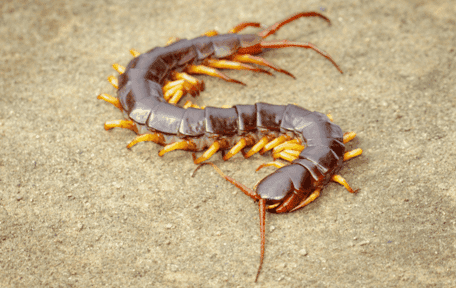A Quick Guide to Centipede & Millipede Control in West Palm Beach
We've all seen them: long, worm-like creatures with what looks like thousands upon thousands of legs. Millipedes and centipedes are common nuisance pests in West Palm Beach because they're drawn to humid habitats and moisture-rich areas. Knowing some of the basic identifiers and characteristics of these creepy crawlers can be extremely helpful in accurately identifying them in and around your home.
What's the Difference Between Centipedes and Millipedes?
Millipedes and centipedes are often confused with each other, but this is more due to the similarity in their names rather than their appearance. They're pretty easy to tell apart if you look at them side-by-side. Here are some key features that will help you tell centipedes and millipedes apart:
Millipedes in West Palm Beach
- Body Shape: Millipedes have long, cylindrical bodies that are segmented into rounded sections called diplosomites. They also have a tough-shelled exoskeleton.
- Legs: Millipedes can have anywhere between 80 and 400 legs. They usually have two pairs of legs per body segment.
- Length: Millipedes are anywhere from ½ inch to 15 inches long, depending on the species.
- Color: Millipedes are typically brown, black, or red.
Centipedes in West Palm Beach
- Body Shape: Centipedes have flat, elongated bodies.
- Legs: Unlike millipedes, centipedes only have one pair of legs per body segment. They can have anywhere between 30 and 354 legs, but they always have an odd number of pairs.
- Length: Centipedes are usually one to six inches long.
- Color: Centipedes' bodies are typically brown, red, or yellow-ish gray in color. Their legs are often a different color than their bodies, and range from yellow to red.
- Mandibles: Centipedes have distinct, elongated mandibles along with two pairs of maxillae.

What do Centipedes Eat?
Centipedes are nocturnal predators that eat a broad range of prey. This includes silverfish, beetle larvae, cockroaches, spiders, and other small arthropods. If you frequently see centipedes indoors, that means there are likely several arthropods in your home that they are preying on.
What do Millipedes Eat?
Unlike centipedes, millipedes aren't predators. Instead, they scavenge for their food and prefer to feed on decomposing organic matter. They prefer to eat decaying plant-based matter but will branch out to animal-based sources of food and even live plants if they're having trouble finding food. They also eat damp or decaying wood, so frequently seeing millipedes indoors may indicate a source of damp or decaying wood somewhere in your home.
How Are Centipedes and Millipedes Similar?
Putting their distinctive differences aside, there are also many similarities between them. Both millipedes and centipedes are considered nuisance pests. They both move very slowly by making wave-like motions with their legs, and they both curl into little balls when they're disturbed.
Centipedes and millipedes also come inside for similar reasons. They're attracted to sources of moisture and food inside your home, and when the outside environment becomes too uncomfortable for them, they look for harborage areas indoors.
Are Centipedes and Millipedes Dangerous?
While they're certainly unpleasant to look at, these nuisance pests aren't considered harmful. Centipedes are venomous, but they're not fatal to humans. There's no denying their painful bite, which can certainly cause discomfort, but it's nothing life-threatening.
Millipedes, on the other hand, aren't venomous. However, when disturbed, they can emit a smelly fluid from a gland on the side of their body. If it comes into contact with your skin, it can cause irritation, itchiness, and a rash.
How to Get Rid of Millipedes and Centipedes in West Palm Beach
Even though millipedes and centipedes don't pose a serious threat, they're still unwelcome pests. To keep these pests away from your home, it's best to be proactive. Try using the following preventative methods to get rid of centipedes and millipedes in West Palm Beach:
- Address moisture issues around your home.
- Keep your lawn and landscaping well-trimmed.
- Use a dehumidifier in damp areas of the house.
- Remove any yard and garden debris and decaying wood.
- Seal up and block off potential entry points – including cracks and crevices in your foundation.
- Store firewood off the ground and away from the foundation of your home.
Centipede and Millipede Control in West Palm Beach
The tips listed above can help prevent millipedes and centipedes from entering your home. However, these methods aren't entirely effective on their own. The best way to keep centipedes and millipedes out of your home is with dependable services from local West Palm Beach pest professionals.
Our team at Native Pest Management is experienced in professional millipede and centipede control. We're familiar with their habits and behaviors, and we know how to keep millipedes and centipedes away from your home.
Whatever your centipede and millipede needs are, the team at Native Pest Management can help. Our pest experts will provide you with any advice or assistance that you may need, so don't hesitate to reach out. Give us a call today to get started!
